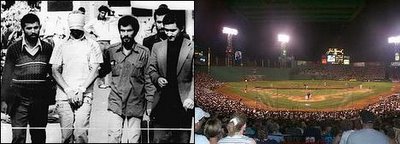 25 years ago today, the day Ronald Reagan was sworn in as the 40th U.S. President, Iran released the 52 Americans being held hostage by student revolutionaries (a leader of which, Mahmoud Ahmadinejad--allegedly pictured above, third from left--is now Iran's president). The students were upset that the United States had admitted Iran's ailing and deposed shah, Mohammad Reza Pahlavi, in for medical treatment (we can only imagine the kinds of people who would hurt innocent persons because others receive medical care). The hostages were diplomats and military personnel, and they were held for a harrowing 444 days, during which time they were regularly blindfolded, tied, and tortured.
25 years ago today, the day Ronald Reagan was sworn in as the 40th U.S. President, Iran released the 52 Americans being held hostage by student revolutionaries (a leader of which, Mahmoud Ahmadinejad--allegedly pictured above, third from left--is now Iran's president). The students were upset that the United States had admitted Iran's ailing and deposed shah, Mohammad Reza Pahlavi, in for medical treatment (we can only imagine the kinds of people who would hurt innocent persons because others receive medical care). The hostages were diplomats and military personnel, and they were held for a harrowing 444 days, during which time they were regularly blindfolded, tied, and tortured.
When they returned to the U.S., they were greeted with parades and other welcome-back festivities. Unbeknownst to at least me and I suspect others, they also received an extraordinary gift from Major League Baseball: a lifetime pass to any major or minor league game. Les Carpenter of the Washington Post details how some of them have used their pass over the last 25 years. (Carpenter, "Safe at Home," Washington Post, 1/20/2006, at A01). Some have used it often, others never, and others have used it to help heal family problems generated by the hostage crisis.
Here is how the idea emerged:
What is the reward for suffering? Baseball commissioner Bowie Kuhn discussed the topic one day in the middle of the hostage crisis with Jeremiah Denton, a Navy admiral who had been held captive in Vietnam and later became a senator from Alabama, as they sat at a baseball game in Cincinnati. Sometime that afternoon, Kuhn is convinced, the idea of a lifetime baseball pass was discussed, though he can't remember the actual conversation. What he does know is that the gift is unique. "You know, I'd be hard-pressed to tell you that we gave out passes to anyone other than them," Kuhn, who retired in 1984, said recently.Obviously, nothing can compensate for what those hostages endured, but a lifetime ticket is certainly a nice gesture. Major League Baseball has often been criticized over the years, but they did right on this one.
Having said that, I had a question after reading this piece: Not to dampen the feel-goodness of this story, but if we assume that the ticket is non-transferable, then what happens if some of the ex-hostages hate baseball and want to sell it, especially those in need of money? If the ticket doesn't require an I.D., then presumably that wouldn't be much of a problem. But does it require an I.D.? The article at one point alludes to an ex-hostage telling a ticket window "who he is," so perhaps there is some kind identification required. While many of us would find a lifetime baseball ticket of extraordinary valuable, we all know people who would never use it. One would hope they too have found value in the ticket.
One other thought: if the lifetime ticket could somehow be sold or traded, would the "lifetime" duration remain tied to the lifespan of the ex-hostage who received the ticket, or the new owner/possessor?





0 comments:
Post a Comment